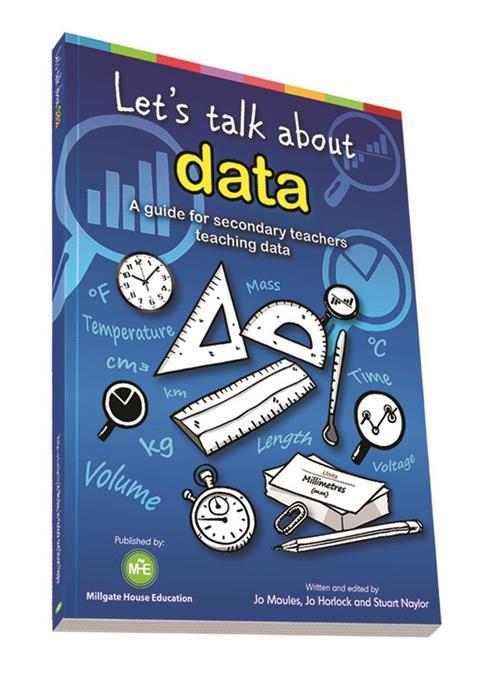Developing data-handling skills
Let’s talk about data
Jo Moules, Jo Horlock and Stuart Naylor
Millgate House Publishers
2016 | 100 pages + CD | £20
ISBN 9780993248627
Reviewed by Trevor Critchley
bit.ly/2oXbdFZ
[PLEASE ADD ‘S’ SYMBOL]
[HEADLINE: Developing key skills]
Jo Moules, Jo Horlock and Stuart Naylor
Millgate House Publishers
2016 | 100 pages + CD | £20
ISBN 9780993248627
With a sound scheme of work already in place, when looking for something new I tend to favour resources that are short, relevant and readily adaptable. Let’s talk about data is just that. Its four sections feature 21 well-designed and extendable activities covering core skills in planning, measuring, presenting and critically analysing data, which have slotted neatly into our Key Stage 3 programme.
The ‘let’s talk’ part is a key feature of each activity. While the resources are very varied – including concept cartoons for the whiteboard, information and data on cards, and worksheets – they all feed nicely into group and whole-class discussion work. As the authors point out, this is an important way to challenge misconceptions and fully develop ideas.
Each activity in the book starts with ‘why is it important?’ to justify the benefits and key objectives of the exercise. Clear instructions then outline how the activity should be introduced to the class. The resources themselves are on the accompanying CD. I have used some of them as quick starters and plenaries, but they have been most beneficial when used to accompany practical work. For example ‘planning range and interval’ and ‘choice of measuring instrument’ were really useful short activities just before a class experiment. And ‘which graph’, ‘lines of best fit’ and ‘patterns in graphs’ were a great way to cement good practice before the class analysed their own experimental data.
I have used this as something I could slot into my existing scheme, but there is plenty of scope for extending each activity into a more in-depth exercise using the ‘what next?’ suggestions. Furthermore, each has a supplementary activity to extend things further. Some of these are quite in-depth and could provide a whole lesson’s focus.
Now that the formulaic coursework format has been replaced at GCSE and A-level in favour of assessing experimental skills through written examination, it is perhaps even more important students develop a strong understanding of the how and why of practical work. For that reason, as well as its off-the-shelf usability, I would highly recommend this excellent resource.
Purchase Let’s talk about data from Amazon.co.uk










No comments yet